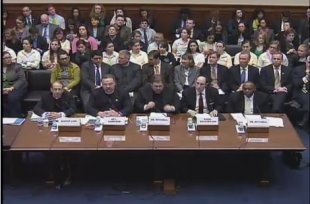I realize that talking about sexual harassment is sooo ‘last year’, but there still remains a sizeable contingent of the atheist (and non-atheist) community that thinks that reports of sexual harassment at conventions is overblown, and does not merit a response or even a robust discussion. The prevailing thought repeatedly comes back to “just report it”, with the corresponding assertion that since we are not awash in reports of harassment, harassment doesn’t exist. Absence of evidence (of that specific kind) is evidence of absence, so anyone who complains about it should just STFU.
The world is fundamentally fair when it comes to reporting sexual harassment. Harassment claims are handled with appropriate gravity, and claims can be properly adjudicated according to the abundance of evidence that exists when harassment takes place. True claims are not (or very rarely) dismissed or explained away by blaming the victim. The absence of verified claims is therefore a valid indicator of the lack of real harassment. Those who speak about harassment in the absence of verifiable evidence are therefore lying in order to destroy the movement.
It does not occur to people that, because victims of harassment very rarely have video/tape recording of every interaction they’ve ever had with another person, and because harassers rarely target people when there are witnesses around, “true” harassment claims are very difficult to separate from “false” ones. As a result, the level of evidence they demand* is either by definition impossible to produce, or only possible in the most egregious of circumstances. An approach is needed that allows victims of harassment to feel comfortable that filing a report will have a meaningful result, rather than triggering an avalanche of suspicion and victim blaming.
The “just report it” response breaks down even further when issues of power and authority are involved, as we have seen recently.
But maybe mine is not the word you want to take for it: [Read more…]



